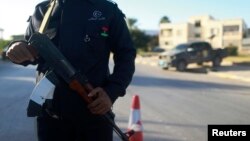The United Nations is calling for international action to slow the chaos in Libya, saying fighting there could destabilize the entire region.
Islamic State (IS)-supporting militants are only one part of Libya’s security crisis. But as the United Nations works towards peace talks between rival governments and militias, U.N. special envoy Bernadino Leon says they will not be part of the solution. “This of course has to be done through the involvement of all the armed groups, except the ones that have been declared terrorist groups,” he states.
Violence continues
During the weekend, fighting stopped operations at two of Libya’s largest oil ports. Amid the chaos, officials say militants supporting IS have set up training camps.
The CEO of security consulting firm Country Risk Solutions, Daniel Wagner, says fighting Islamist militants in Libya is critical to regional security, but he says Ansar al-Sharia, a Libyan militant group that has pledged allegiance to the Islamic State, is part of a larger problem.
In the past decade, he says, the number of violent jihadi groups in the world has nearly doubled to 41.
“That is the number of extremist groups that exist in the world today. The basic thesis is that, contrary to what we in the West would like to believe, my contention is that it is them who are setting the agenda for us, and we are reacting. Rather than us sort of saying to them: ‘This [is] how things are going to be,’” notes Wagner.
Extremist groups gain power
He says Western powers have their hands tied by voters who are tired of war and unconvinced they are in imminent danger.
Wagner says it is almost impossible to guess the consequences if the groups gaining power across Africa and the Middle East better coordinate or join forces.
“If there is a coalescing of their objectives and their tactics and their operational methods, I would say we would look back and view where we are right now as the appetizer in a very large meal,” he says.
Since the Islamic State captured territory in Syria and Iraq, and gained infamy with high-profile murders and a massive media campaign, the group has become a “common rallying flag” for Islamist groups, he adds.
Backlash
While the West is limited to airstrikes and providing support for Iraq’s beleaguered army and for rebel groups in Syria, other countries fighting the Islamic State are feeling a backlash from its supporters at home.
“There appears to be a situation in some of the Gulf countries that is causing concern about ‘lone wolf’ attacks, essentially individuals who have not been to Iraq or Syria, but have sympathies with the organization,” remarked Gulf State Analytics founder Giorgio Cafiero.
Cafiero says IS supporters could eventually take orders from the group, and in countries like Saudi Arabia sectarian tensions are already on the rise. “The real threat is that individuals in the Kingdom will start acting on behalf of the organization in a completely independent way. And the danger is that this kind of threat is very hard to deal with. There is almost nothing that the authorities can do to stop it,” he adds.
Other countries fighting IS may face blowback from groups in Libya, Cafiero adds. Last month, car bombs in Libya exploded near the embassies of the United Arab Emirates and Egypt.
But Cafiero and other analysts say fighting militants in Libya is critical to containing, if not ending, the Islamic State.





